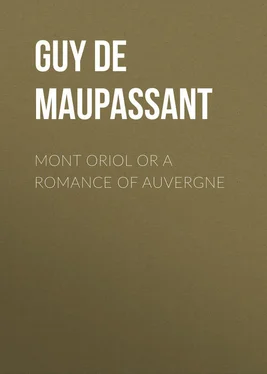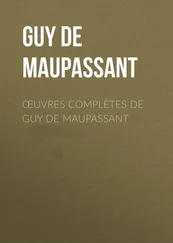Guy Maupassant - Mont Oriol or A Romance of Auvergne
Здесь есть возможность читать онлайн «Guy Maupassant - Mont Oriol or A Romance of Auvergne» — ознакомительный отрывок электронной книги совершенно бесплатно, а после прочтения отрывка купить полную версию. В некоторых случаях можно слушать аудио, скачать через торрент в формате fb2 и присутствует краткое содержание. Жанр: literature_19, foreign_antique, foreign_prose, на английском языке. Описание произведения, (предисловие) а так же отзывы посетителей доступны на портале библиотеки ЛибКат.
- Название:Mont Oriol or A Romance of Auvergne
- Автор:
- Жанр:
- Год:неизвестен
- ISBN:нет данных
- Рейтинг книги:4 / 5. Голосов: 1
-
Избранное:Добавить в избранное
- Отзывы:
-
Ваша оценка:
- 80
- 1
- 2
- 3
- 4
- 5
Mont Oriol or A Romance of Auvergne: краткое содержание, описание и аннотация
Предлагаем к чтению аннотацию, описание, краткое содержание или предисловие (зависит от того, что написал сам автор книги «Mont Oriol or A Romance of Auvergne»). Если вы не нашли необходимую информацию о книге — напишите в комментариях, мы постараемся отыскать её.
Mont Oriol or A Romance of Auvergne — читать онлайн ознакомительный отрывок
Ниже представлен текст книги, разбитый по страницам. Система сохранения места последней прочитанной страницы, позволяет с удобством читать онлайн бесплатно книгу «Mont Oriol or A Romance of Auvergne», без необходимости каждый раз заново искать на чём Вы остановились. Поставьте закладку, и сможете в любой момент перейти на страницу, на которой закончили чтение.
Интервал:
Закладка:
"And so he's taking acidulated baths – they're called acidulated, are they not? – in order to restore himself."
"Yes. He's doing all I told him to do. Oh! he has been hit hard. He's a violent youth, terrible, and has been at death's door. He wanted to kill himself, too. It was an actress – a well-known actress. He was madly in love with her. And then she was not faithful to him, do you see? The result was a frightful drama. So I brought him away. He's going on better now, but he's still thinking about it."
She smiled for a moment, then, becoming grave, she returned:
"It will amuse me to see him."
For her, however, this thing, "Love," did not mean very much. She sometimes bestowed a thought on it, just as you think, when you are poor, now and then of a pearl necklace, of a diadem of brilliants, with a desire awakened in you for this thing – possible though far away. This fancy would come to her after reading some novel to kill time, without attaching to it, beyond that, any special importance. She had never dreamed about it much, having been born with a happy soul, tranquil and contented, and, although now two years and a half married, she had not yet awakened out of that sleep in which innocent young girls live, that sleep of the heart, of the mind, and of the senses, which, with some women, lasts until death. For her life was simple and good, without complications. She had never looked for the causes or the hidden meaning of things. She had lived on from day to day, slept soundly, dressed with taste, laughed, and felt satisfied. What more could she have asked for?
When Andermatt had been introduced to her as her future husband, she refused to wed him at first with a childish indignation at the idea of becoming the wife of a Jew. Her father and her brother, sharing her repugnance, replied with her and like her by formally declining the offer. Andermatt disappeared, acted as if he were dead, but, at the end of three months, had lent Gontran more than twenty thousand francs; and the Marquis, for other reasons, was beginning to change his opinion.
In the first place, he always on principle yielded when one persisted, through sheer egotistical desire not to be disturbed. His daughter used to say of him: "All papa's ideas are jumbled up together"; and this was true. Without opinions, without beliefs, he had only enthusiasms, which varied every moment. At one time, he would attach himself, with a transitory and poetic exaltation, to the old traditions of his race, and would long for a king, but an intellectual king, liberal, enlightened, marching along with the age. At another time, after he had read a book by Michelet or some democratic thinker, he would become a passionate advocate of human equality, of modern ideas, of the claims of the poor, the oppressed, and the suffering. He believed in everything, just as each thing harmonized with his passing moods; and, when his old friend, Madame Icardon, who, connected as she was with many Israelites, desired the marriage of Christiane and Andermatt, and began to preach in favor of it, she knew full well the kind of arguments with which she should attack him.
She pointed out to him that the Jewish race had arrived at the hour of vengeance. It had been a race crushed down as the French people had been before the Revolution, and was now going to oppress others by the power of gold. The Marquis, devoid of religious faith, but convinced that the idea of God was rather a legislative idea, which had more effect in keeping the foolish, the ignorant, and the timid in the right path than the simple notion of Justice, regarded dogmas with a respectful indifference, and held in equal and sincere esteem Confucius, Mohammed, and Jesus Christ. Accordingly, the fact that the latter was crucified did not at all present itself as an original wrongdoing but as a gross, political blunder. In consequence it only required a few weeks to make him admire the toil, hidden, incessant, and all-powerful, of the persecuted Jews everywhere. And, viewing with different eyes their brilliant triumph, he looked upon it as a just reparation for the indignities that so long had been heaped upon them. He saw them masters of kings, who are the masters of the people – sustaining thrones or allowing them to collapse, able to make a nation bankrupt as one might a wine-merchant, proud in the presence of princes who had grown humble, and casting their impure gold into the half-open purses of the most Catholic sovereigns, who thanked them by conferring on them titles of nobility and lines of railway. So he consented to the marriage of William Andermatt with Christiane de Ravenel.
As for Christiane, under the unconscious pressure of Madame Icardon, her mother's old companion, who had become her intimate adviser since the Marquise's death, a pressure to which was added that of her father and the interested indifference of her brother, she consented to marry this big, overrich youth, who was not ugly but scarcely pleased her, just as she would have consented to spend a summer in a disagreeable country.
She found him a good fellow, kind, not stupid, nice in intimate relations; but she frequently laughed at him along with Gontran, whose gratitude was of the perfidious order.
He would say to her: "Your husband is rosier and balder than ever. He looks like a sickly flower, or a sucking pig with its hair shaved off. Where does he get these colors?"
She would reply: "I assure you I have nothing to do with it. There are days when I feel inclined to paste him on a box of sugar-plums."
But they had arrived in front of the baths. Two men were seated on straw chairs with their backs to the wall, smoking their pipes, one at each side of the door.
Said Gontran: "Look, here are two good types. Watch the fellow at the right, the hunchback with the Greek cap! That's Père Printemps, an ex-jailer from Riom, who has become the guardian, almost the manager, of the Enval establishment. For him nothing is changed, and he governs the invalids just as he did his prisoners in former days. The bathers are always prisoners, their bathing-boxes are cells, the douche-room a black-hole, and the place where Doctor Bonnefille practices his stomach-washings with the aid of the Baraduc sounding-line a chamber of mysterious torture. He does not salute any of the men on the strength of the principle that all convicts are contemptible beings. He treats women with much more consideration, upon my honor – a consideration mingled with astonishment, for he had none of them under his control in the prison of Riom. That retreat being destined for males only, he has not yet got accustomed to talking to members of the fair sex. The other fellow is the cashier. I defy you to make him write your name. You are just going to see."
And Gontran, addressing the man at the left, slowly said:
"Monsieur Seminois, this is my sister, Madame Andermatt, who wants to subscribe for a dozen baths."
The cashier, very tall, very thin, with a poor appearance, rose up, went into his office, which exactly faced the study of the medical inspector, opened his book, and asked:
"What name?"
"Andermatt."
"What did you say?"
"Andermatt."
"How do you spell it?"
"A-n-d-e-r-m-a-t-t."
"All right."
And he slowly wrote it down. When he had finished, Gontran asked:
"Would you kindly read over my sister's name?"
"Yes, Monsieur! Madame Anterpat."
Christiane laughed till the tears came into her eyes, paid for her tickets, and then asked:
"What is it that one hears up there?"
Gontran took her arm in his. Two angry voices reached their ears on the stairs. They went up, opened a door, and saw a large coffee-room with a billiard table in the center. Two men in their shirt-sleeves at opposite sides of the billiard-table, each with a cue in his hand, were furiously abusing one another.
Читать дальшеИнтервал:
Закладка:
Похожие книги на «Mont Oriol or A Romance of Auvergne»
Представляем Вашему вниманию похожие книги на «Mont Oriol or A Romance of Auvergne» списком для выбора. Мы отобрали схожую по названию и смыслу литературу в надежде предоставить читателям больше вариантов отыскать новые, интересные, ещё непрочитанные произведения.
Обсуждение, отзывы о книге «Mont Oriol or A Romance of Auvergne» и просто собственные мнения читателей. Оставьте ваши комментарии, напишите, что Вы думаете о произведении, его смысле или главных героях. Укажите что конкретно понравилось, а что нет, и почему Вы так считаете.












